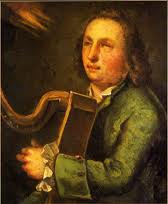Annotation:Lord Dillon: Difference between revisions
No edit summary |
m (Text replacement - "garamond, serif" to "sans-serif") |
||
| (One intermediate revision by one other user not shown) | |||
| Line 1: | Line 1: | ||
'''Back to [[{{BASEPAGENAME}}]]''' | '''Back to [[{{BASEPAGENAME}}]]''' | ||
---- | ---- | ||
<p><font face=" | <p><font face="sans-serif" size="4"> | ||
'''LORD DILLON.''' Irish, Air (cut time). F Major. Standard tuning (fiddle). AABB. The Dillon family came to prominence in the time of Queen Elizabeth, the scion of the family being a provincial tax collector who helped in the fight against the 'rebel Irish' under Tyrone. The family seat was at Lough Glynn, County Roscommon, near the border with Mayo. By the time of the Williamite Wars, however, the family was on the Royalist side, fighting for King James. O'Sullivan (1958) identifies the subject of Carolan's piece as Richard, 9th Viscount Dillon, born in 1688. He succeeded his father to the title in 1713, and was summoned to the House of Lords in 1715 to take the oath of allegiance to the Crown, which he did, but, when asked to take further oaths (i.e. abjuring the spiritual authority of the Pope along with other Catholic dogma) he "was pleased to say he would consider of it, and withdrew." He died in 1737, aged 48. See also Carolan's compositions for Richard's wife, "[[Lady Dillon]]." | '''LORD DILLON.''' Irish, Air (cut time). F Major. Standard tuning (fiddle). AABB. The Dillon family came to prominence in the time of Queen Elizabeth, the scion of the family being a provincial tax collector who helped in the fight against the 'rebel Irish' under Tyrone. The family seat was at Lough Glynn, County Roscommon, near the border with Mayo. By the time of the Williamite Wars, however, the family was on the Royalist side, fighting for King James. O'Sullivan (1958) identifies the subject of Carolan's piece as Richard, 9th Viscount Dillon, born in 1688. He succeeded his father to the title in 1713, and was summoned to the House of Lords in 1715 to take the oath of allegiance to the Crown, which he did, but, when asked to take further oaths (i.e. abjuring the spiritual authority of the Pope along with other Catholic dogma) he "was pleased to say he would consider of it, and withdrew." He died in 1737, aged 48. See also Carolan's compositions for Richard's wife, "[[Lady Dillon]]." | ||
[[File:Carolan.jpg|200px|thumb|left|Turlough O'Carolan]] | |||
<br> | <br> | ||
<br> | <br> | ||
</font></p> | </font></p> | ||
<p><font face=" | <p><font face="sans-serif" size="4"> | ||
''Source for notated version'': John Lee's '''A Favourite Collection of the so much admired old Irish Tunes, the original and genuine compositions of Carolan, the celebrated Irish Bard''' (Dublin, 1780) [O'Sullivan]. | ''Source for notated version'': John Lee's '''A Favourite Collection of the so much admired old Irish Tunes, the original and genuine compositions of Carolan, the celebrated Irish Bard''' (Dublin, 1780) [O'Sullivan]. | ||
<br> | <br> | ||
<br> | <br> | ||
</font></p> | </font></p> | ||
<p><font face=" | <p><font face="sans-serif" size="4"> | ||
''Printed sources'': O'Sullivan ('''Carolan: The Life, Times and Music of an Ancient Harper'''), 1958; No. 34, pp. 120-121. | ''Printed sources'': O'Sullivan ('''Carolan: The Life, Times and Music of an Ancient Harper'''), 1958; No. 34, pp. 120-121. | ||
<br> | <br> | ||
<br> | <br> | ||
</font></p> | </font></p> | ||
<p><font face=" | <p><font face="sans-serif" size="4"> | ||
''Recorded sources'': <font color=teal></font> | ''Recorded sources'': <font color=teal></font> | ||
</font></p> | </font></p> | ||
Latest revision as of 14:17, 6 May 2019
Back to Lord Dillon
LORD DILLON. Irish, Air (cut time). F Major. Standard tuning (fiddle). AABB. The Dillon family came to prominence in the time of Queen Elizabeth, the scion of the family being a provincial tax collector who helped in the fight against the 'rebel Irish' under Tyrone. The family seat was at Lough Glynn, County Roscommon, near the border with Mayo. By the time of the Williamite Wars, however, the family was on the Royalist side, fighting for King James. O'Sullivan (1958) identifies the subject of Carolan's piece as Richard, 9th Viscount Dillon, born in 1688. He succeeded his father to the title in 1713, and was summoned to the House of Lords in 1715 to take the oath of allegiance to the Crown, which he did, but, when asked to take further oaths (i.e. abjuring the spiritual authority of the Pope along with other Catholic dogma) he "was pleased to say he would consider of it, and withdrew." He died in 1737, aged 48. See also Carolan's compositions for Richard's wife, "Lady Dillon."

Source for notated version: John Lee's A Favourite Collection of the so much admired old Irish Tunes, the original and genuine compositions of Carolan, the celebrated Irish Bard (Dublin, 1780) [O'Sullivan].
Printed sources: O'Sullivan (Carolan: The Life, Times and Music of an Ancient Harper), 1958; No. 34, pp. 120-121.
Recorded sources:
Back to Lord Dillon
